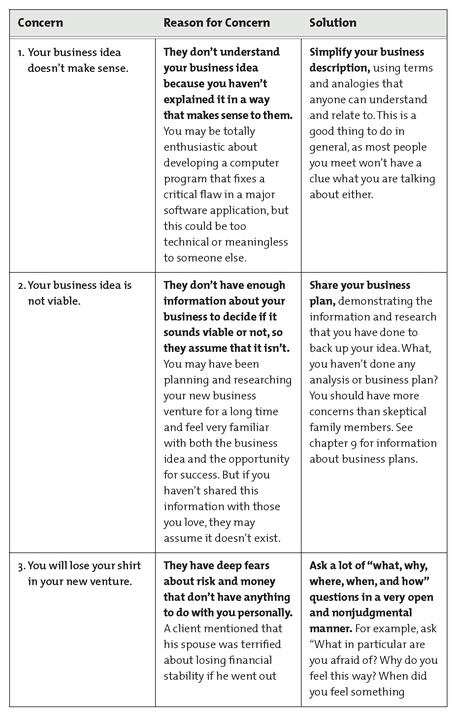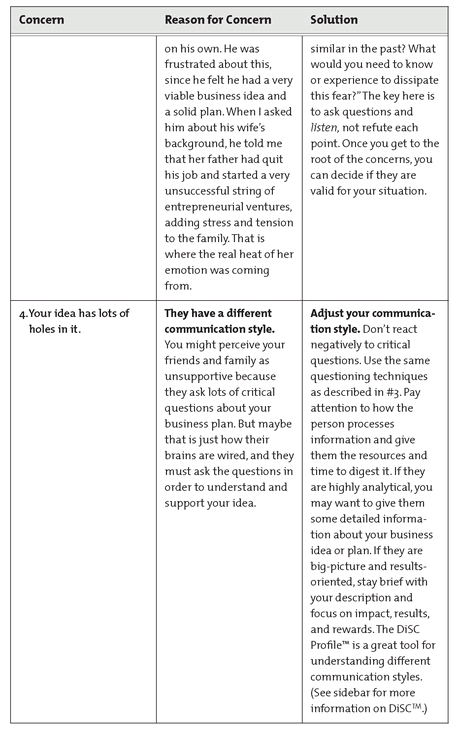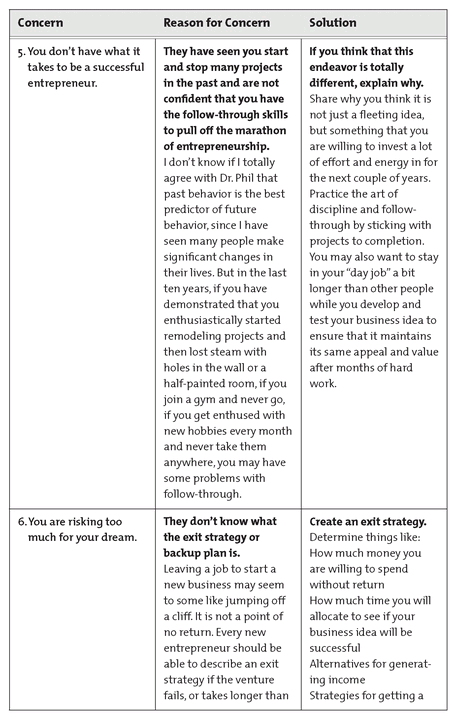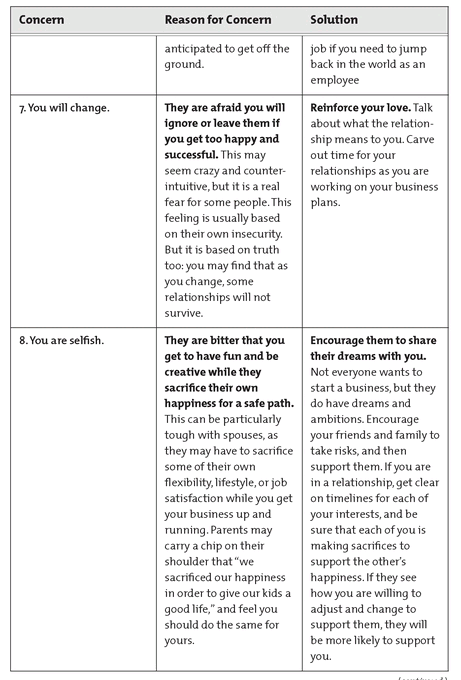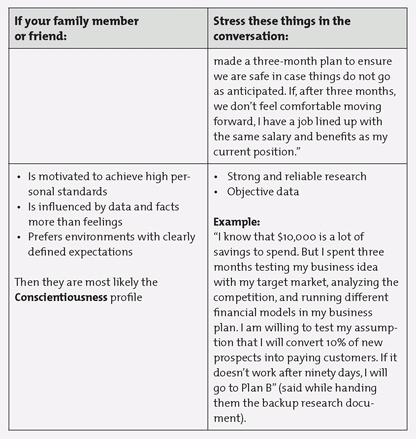14
Dealing with Your Friends and Family
I sat across the table from my client and studied his face as he talked. I could see small beads of sweat on his forehead. He swallowed hard.
I really am not sure what I am doing. After eighteen years climbing the corporate ladder as a sales and marketing manager, I want to be a freelance photographer. People who have known me for a long time think the idea is coming out of left field. My wife thinks I am crazy, and tells me to stop bothering her until I figure it out. Am I losing my mind?
One of the unexpected parts of moving from employee to entrepreneur is discovering that some of those around you are not ready, willing, or able to see you change. This can result in disagreements, fracturing or even ending long-term friendships and relationships. Here is why:
• We usually form relationships around common bonds such as school, work, or community functions. You might have a tight group of friends that helped you through the hell of medical or graduate school. Or you spent many hours in solidarity against an evil boss, griped about the lack of decent, eligible mates in the dating world, or watched your children grow up together. As you move away from these shared experiences, you may find that you don’t have as much in common as you thought you did. And relationships fade.
• Each person in a relationship assumes a specific role. Maybe you have always been the kind and understanding friend who jumps into action when someone is in need, providing a shoulder to cry on, a truck to move furniture, or money to get out of a crisis. You may be the child who always made your parents proud, getting good grades, going to the “right” school, and getting a safe job. Your spouse may see you as a “rock,” providing financial stability for the whole family. So if you decide to change roles, be prepared for some resentment. A true clue this is the case is when someone says, “What happened to the person I used to know? You don’t act the same anymore!” They are right . . . and this is good!
• You might be headed in a direction that freaks out your family and friends. If you have always followed a safe and “respectable” path and suddenly contemplate doing something totally different, you may see some stunned reactions. Some friends may think that you have simply lost your mind. Others may be projecting their own insecurity on you by thinking, “If Ashok isn’t satisfied with mundane suburban life, maybe I shouldn’t be satisfied with my life either!”
• As much as we all talk about wanting to be happy and fulfilled, when you actually are, it can annoy the crap out of those around you. We bond with each other by our daily gripes. We start by sharing the depressing news in the paper with our spouse, then let the receptionist at work know how bad traffic was, then mumble quietly to a coworker about the stupid meeting we have to attend to start our day. And this is all before nine a.m. Can you imagine waking up and smiling at the day ahead of you? When someone asks you how you are, answering: “I am great, couldn’t be better!” While eyeing you with suspicion, your friends may quietly check your bag for illicit drugs. Once they find you are on a natural high, they may tire of your positive demeanor and look for someone else to complain with.
How Can You Get Through These Tough Relationship Transitions?
Given what I just described, communicating with friends and relatives can be challenging. So let me give you the short version of this chapter:
You are crazy if you think you can convince all your friends and family that starting a business is a good idea.
Everyone has his own version of reality, a set of principles and values that may or may not be in sync with yours. No amount of information, communication tools, or techniques will influence someone who fundamentally disagrees with entrepreneurship as a viable employment option. Knowing this actually makes your job easier. Your task is not to sell your idea, it is to present it in a way that reflects your heartfelt intentions, and is clear, organized, and accessible.
With that in mind, there are four critical points:
• Common concerns about self-employment and their solution
• How to talk to your spouse about self-employment
• How to talk to your parents about self-employment
• How to filter useful feedback and toss the rest
Common Concerns
Family and friends can be a great source of support and love. They can also be ruthless critics.
While this is frustrating, there are actually some very good reasons why those you love may express fear or concern when you tell them you want to start a business. And it is not necessarily because they don’t love you or because they want to see you forever bound to your drab, lifeless cubicle. To better understand their concerns, review this:
Use DiSC to Strengthen Your Message
The DiSC Profile is a tool that describes different communication styles and gives tips on relating to each. I have used it for over ten years in all kinds of environments and found it to be exceptionally helpful for tailoring messages to different people. To take the assessment online, see
www.escapefromcubiclenation.com/disc. Otherwise, look for clues here:
There will be some relationships that do not survive your change from employee to entrepreneur, and that is okay. If you lose someone dear to you through this process, keep these things in mind:
• Honor the history you have together. It can be perplexing and painful to lose connection with people you love deeply. But it will solve nothing to get angry and say something hurtful that you will regret. If you are able, tell your friends how much you appreciate all the years you had together. If you aren’t talking, write the words down in a journal, or say them in a silent reflection.
• Trust that “your people” will show up for this new phase of life. There is an awkward stage of transition where some of your old friends may not be available anymore, and you don’t have any new friends to support you. This is a very lonely place. Trust in yourself, and keep moving on your path toward your right life. When you least expect it, new, wonderful people will appear to support and encourage you.
I have a hard time letting friendships and relationships go, even when it has become clear that that is the natural course of things sometimes. But you are right—in my heart I know I am headed in the right direction at the moment, even though that makes it difficult, even with some family members who would prefer I stay in a rut similar to theirs so they will have someone to commiserate with.
1Armed with an understanding of the most common concerns about self-employment and some tips for communicating your message effectively, now it’s time to tackle two of your most significant and difficult relationships: your spouse and your parents.
Getting Your Spouse On Board
At age forty, Matthew Scott appeared to have it all. The vice president of sales for a successful medical devices company, this former Special Forces military commander had done all the right things. He married his seventh-grade sweetheart and had three beautiful children. He had a fancy house in San Diego by the beach. Work took him all around the globe. He was well paid and well respected. What he lacked, however, was a sense that his life had any meaning. So without warning, he told his wife he was going to take off to figure things out.
His wife, who had stood by him for military deployments overseas, stressful sales jobs, and a travel schedule that took him away from home for weeks at a time, was perplexed by his decision.
I blew my first attempt at following my “calling” with my wife. I told her how unhappy I was in my work and something was missing in my life and headed for the coastline to “figure it out.” Well, as you can imagine when your forty-year-old husband says this you would freak out and imagine the worst. I could not understand why she was so concerned about me doing this and began to internalize my own head-trash of thinking she was ungrateful and did not want to jeopardize our so-called great life with my fancy title and big house. Boy, was I a putz!
2What Matthew forgot, as many stressed-out corporate employees do, is that it is very easy for spouses to mistake career despair for relationship despair. For this reason, it is critical to communicate early, often, and openly with your spouse about your desire to start a business.
You never start a business by yourself; whether they want to or not, your spouse and children start it with you. Unlike a business partner who can bow out if things get tough, your spouse and children are in it for the long haul. Your success or failure has very concrete and scary impacts on things like level of personal debt, credit rating, child care, and quality of family time.
So start communicating early about your desire to start a business. You will set precedent with your first conversation. To do it well, follow these guidelines:
How to Break the News to Your Spouse That You Want to Quit Your Job
• Choose a low-stress moment when you have time and energy for a long conversation. It is not fair to drop a major bombshell when you won’t have time to discuss it. Don’t talk about it right before bed or in the morning before heading off to work, as this will just stir up questions in your spouse’s mind.
• Choose the best setting for your conversation. I find it is a lot easier to have a deep, meaningful conversation with my husband when we are up and moving around. We have had some of our best conversations on long walks or drives. Because you should be concerned about your spouse’s preferred communication style and not your own, choose the place that he feels the most comfortable with.
• Minimize distractions. Get your kids a sitter and turn off your cell phone and BlackBerry. Don’t go somewhere like your favorite local café where you will be interrupted by lots of friends. You need complete focus in this conversation.
• Explain why you are so excited about starting your own business. Make sure your spouse knows all about why this idea is so compelling to you and why you are excited about it. Don’t just talk about the business idea, talk about what it would mean to you personally to get enjoyment from your work. Would you have more energy? Would you watch less TV? Want to help around the house more? Become a nineteen-year-old sex machine? (Okay, okay, now you’re going overboard.)
• Explain the consequences of not following your dreams. Everyone processes job stress differently. Some people have a high tolerance for staying in an unhappy or stressful work situation if it means bringing home lots of money. Others have very low tolerance and develop health problems including depression, high blood pressure, weight gain, anxiety disorders, and low energy. Make sure your spouse understands the consequences for you if you are unhappy with your work.
• Ask lots of questions. Your spouse may say something like “If you quit your job, we will lose all financial stability!” Make sure you really understand what he is talking about and ask, “What in particular are you concerned about? What amount of money in the bank would make you comfortable that our expenses are covered? What is it about me being self-employed that makes you the most nervous?” You may find after asking a lot of questions that the original reasons he gave are not the real, emotionally charged reasons. The real fears are things like “If you get really happy and successful, you may leave me!” or “If you do what you love, I will have to sacrifice all my happiness for you!” or “If you start your own business, you will destroy our family, just like my dad did.”
• Reciprocate. Ask your spouse how he is feeling in his work life. What would make him more happy and fulfilled? What big dreams does he have? How can you help him reach his goals?
• Take the advice to heart! Don’t view this conversation as a one-way sales call. Your spouse may have some very valid reasons for his resistance, and you should carefully listen to and reflect on what they are. All of us know a family member, neighbor, or work colleague who blew the family savings on day trading or a harebrained get-rich-quick scheme. Make sure you aren’t that person. Even if you don’t agree with all of your spouse’s concerns, acknowledge and respect them.
• Make a plan to continue the conversation. You will definitely not resolve all your concerns in one sitting. Plan on spending more time discussing the issues until you both feel comfortable with the plan.
If you follow these guidelines, you are likely to have a rich, useful discussion. Just make sure you don’t commit these faux pas:
How NOT to Talk to Your Spouse About Self-employment
Over the phone. This conversation needs to be live and unplugged. You simply cannot discuss such a meaty issue unless you are face-to-face.
By e-mail. Using the impersonal medium of e-mail to talk about a deeply personal topic may be frustrating to your spouse. If both of you are busy and in front of e-mail all the time, it is fine to follow up with specific links, tips, and articles once you have had a good initial conversation about your interest in starting a business. But don’t start it that way.
In the middle of financial stress. You will fan the flames of fear if you talk about leaving your job right when you are stressing out about bills or facing a huge property tax or tuition bill. Try to pick the most stable financial time to talk about this issue. If your financial life is continually in flux, you may want to address that issue first by reducing expenses and paying down debt as you will need a bit of wiggle room in the months you are starting up your business.
In front of your kids. Although I do think it is good to share your plans with your kids, don’t raise the topic for the first time over family dinner. Depending on their age, your kids may get upset if they hear you and your spouse disagreeing and stressing about money. They want to know that no matter what happens their life will be secure, so plan to have a conversation with your kids once you and your spouse have a mutually acceptable plan.
Once you have your initial conversation, make regular communication with your spouse a priority. Create a plan to address the concerns raised in your first conversation and follow up. Your spouse will want to see you persist with your business idea and stick with it, despite obstacles. They also want to see that you respect their opinion and treat them as a full partner. To create an environment for effective communication and minimized conflict, clarify the following things:
Key Things to Clarify with Your Spouse as You Build Your Business
• The type and amount of information your spouse wants about the business
• The role (if any) he or she wants to play in the new business
• How you will make joint financial decisions
• Mutually agreed upon timeframe for testing the viability of the business
• Exit strategy, with specific alternatives and responsibilities for both parties
These practices really do work when there is a solid relationship to start with. Matthew, whom I introduced earlier in the chapter, followed all of these good communication practices (after his initial bungling!), and his story ended well. He and his wife discussed career change options at length. They spent six months choosing the best place to raise their kids and moved from San Diego to the Oregon coast. They articulated and designed an ideal life together. Matthew started a very successful practice as a coach and consultant. Their marriage and life are good. Their kids are thriving.
Not all stories end this way. I don’t mean to scare you. But when you start to make major changes in your life, any weaknesses in your relationship are amplified. It is like dropping a brick on the exact line of a bone fracture.
What Happens If Your Spouse Is Totally Resistant and No Amount of Heartfelt Conversation Will Garner His Support for Your Dream?
This is where I must bow out and refer you to a more competent adviser like a couples counselor. If your spouse or significant other is totally uninterested in your happiness, it sounds like there may be some bigger challenges in your relationship. Successful entrepreneur Francine Hardaway found this out the hard way:
I lost a husband to my entrepreneurial dream. When I quit my nice safe professorship to start my first company, my professor husband (who was my department chairman) decided I was going to be a failure and lose all our savings, impacting our financial future. He found himself another girlfriend and left me (in that order).
But I made enough money to be the major support of our children, and he evolved into the one who took them to the library and the dentist. We worked it out and remained friends, but my risk tolerance was so different from his that we couldn’t stay married.
3
Getting Your Parents On Board
If you thought spouses were resistant, just wait until you tell your parents that you want to quit your stable corporate job to start a business.
You may be one of the lucky ones like me who have parents who enthusiastically support anything you do, even if it includes traveling by yourself to Rio de Janeiro to study martial arts, starting a business with no experience, or running off to Arizona to marry a Navajo medicine man. There is not much I could do that my parents wouldn’t support unless it made me unhappy or broke a law.
Or you could be like Peter W.:
My dad arrived in the U.S. as an immigrant from Germany. He escaped just as the Nazis were taking power. He spent his whole life working hard in mind-numbing but stable jobs so that his kids could have better opportunities than he had. Self-realization and personal development are not part of his vocabulary. I am scared to death to tell him that I want to quit my comfortable job as a software engineer to start a photography business.
Peter faces a very common challenge that is exacerbated by the following characteristics of parents.
4• Parents can push your buttons like no one else on the planet.
• They grew up in an era when the work contract was very different from what it is today (both the literal and figurative contract, including expectations between employer and employee).
• No matter how old you are, your parents see you as a child.
• Their biggest concern is for your safety.
So when speaking with your parents, follow all the advice you have read thus far including:
• Choose the right place and time to speak to them.
• Provide the right information communicated in the way best suited to their communication style.
• Do not get defensive. Ask questions to understand their concerns.
But pay attention to these common traps in parent-child communication:
Common Traps When Discussing Your Career with Your Parents
•
Thinking they understand what you are talking about. Anyone who has tried to explain “Social Media,” “Web 2.0,” or blogging to an elder relative may recognize the vacant stare and look of puzzlement on their face. Even nontechnical people your age can get confused. My husband has grown up in the low-tech environment of the construction industry and rarely touches the computer except to play Solitaire. The first time I talked about my blog, he thought I said “ blob.” I can just imagine the image that came to his mind of a gigantic, gooey dark creature that oozed its way through the city streets, slowly gobbling up people and cars.
Solution: Reduce any and all jargon. Talk about your business concept in a very simple way that anyone from a seven- to a seventy-year-old can understand. “Mom, having a blog is kind of like sitting down and writing a letter to someone every day. But instead of it being delivered to only one mailbox, the same letter gets delivered to a thousand. And if someone likes what they read, they write me back right away.”
•
Thinking they understand that you have changed since your failed lemonade business in fifth grade. Try as we might, it is so hard to break the stereotypes that our parents have about us based on what they saw when we were growing up. “You could never stick to one thing, Martha, you were always distracted in your studies,” or “Bob, how in the world could you start your own business? Remember how painfully shy you were in high school? Your mom had to go to the prom with you!” Even if they don’t come right out and say it, you can feel their disapproval based on their body language or tone of voice. My friend Desiree and I talk about the “The Tone” that our moms use with us occasionally on the phone. They don’t have to say a word, it is just the way they say “hmmmm” that lets us know they don’t agree with what we are saying. Now that we are moms too, we are carefully perfecting our Tones. Solution: Change your expectations. You will never be able to convince your family you have outgrown your innate shyness, so stop trying. Show results by your actions. If you get too frustrated in a conversation, smile and change the subject quickly. The worst thing you can do is argue your point. You will never win, and will most likely revert to acting like a ten-year-old.
•
Thinking they understand the changing job market. Some parents are perplexed by the fact that the average person now has seven careers in a lifetime. They grew up in a world where the best career security was finding a good job in a good company and staying until retirement. Lots of job changes were seen as being irresponsible, unstable, and a sign of a poor work ethic.
Solution: Come armed with a nice “elevator speech” about today’s job market so that you can help them see that you are not outside of the norm.
“Twenty-five percent of women in their mid-forties are successfully starting businesses, Dad,” or recite the “seven careers per lifetime” statistic above. If they still don’t get it, let it go and change the subject.
I once told my dad I wanted to start a small business. As he was shaking his head he looked me square in the eye and said “don’t do it.” I’m still stuck in the cube and whenever I start planning a venture that thought goes through my head. I’m not sure if he discouraged me because of who my partners were at the time or if he didn’t want me to suffer the “pains” of business ownership. (Jim S.)
Calming Techniques
If, despite your best efforts, conversation with your parents becomes strained, use these calming techniques:
• Breathe deeply and relax. When you feel the conversations get intense or heated, take a deep breath and stop talking. Then follow the next strategy:
• Laugh. If you step back from your personal situation for a minute, you can find the humor in it. Imagine that you are writing a television script about a crazy family. Observe the funny dynamics in your dialogue and laugh from your belly.
• Commiserate with a beloved sibling. Siblings are the only people in the world who truly understand your relationship with your parents. If you have a rough time, call your favorite sibling and give your unedited debrief of the conversation. Commiserate together, share an encouraging word, and move on.
The Final Step: Keep the Useful Feedback and Toss the Rest
I hope your conversations with your friends, spouse, and parents go well. You are likely to come away with a lot of feedback that will be helpful as you refine your business idea, evaluate your finances, and assess the needs of those you love. But you also may be overwhelmed with criticism, or feel frustrated with those who aren’t supportive. You may even hear some insulting, judgmental, and unfair characterizations that make you feel like you are seven years old. At this point, you need to take the feedback and put it through a filter.
Exercise
1. Imagine you have a large, metal tray with a screen bottom, much like you would use to pan for gold.
2. Take all the feedback you have gotten from family and friends and sift it through the screen using the following criteria:
WHAT STAYS
• Specific questions about your business idea that would also concern your target market
• Useful considerations about managing your personal finances
• Insight into your personality; strengths and weaknesses that you feel are accurate
• Valid concerns about relationships with those you love
WHAT GOES
• Judgments about your skills or character that you know aren’t true
• Critique of your business idea from those who know nothing about your field or target market
• Generalized fears like “no one ever makes money being self-employed” or “no one in our family is cut out to be a businessperson” or “Latino males do not start a dance company” or “Asian girls do not manage a punk record label”
• Belittling comments that make you feel two feet tall
You can love, respect, honor, and adore your friends and relatives, but you can’t make them approve of your decisions. If you are happy about the direction of your own life, that is all that matters. In general, most people would rather see you doing something that makes you happy rather than trudging miserably through your life.
But if they are all resistant, don’t despair.
You can always find people who don’t need convincing or cajoling to embrace your idea. They have been in your shoes. They “get” entrepreneurship and are ready to support you as soon as you find them.
